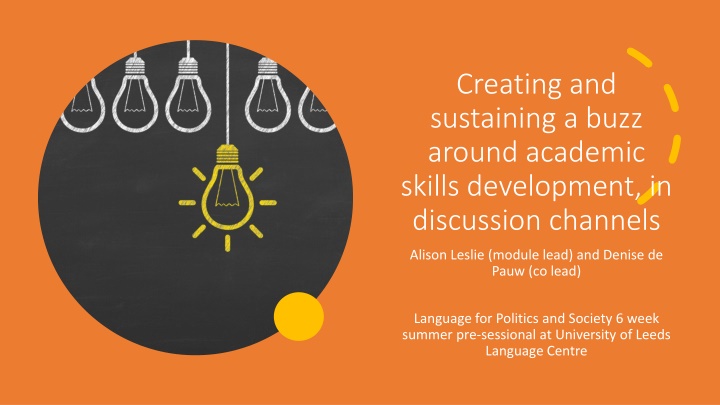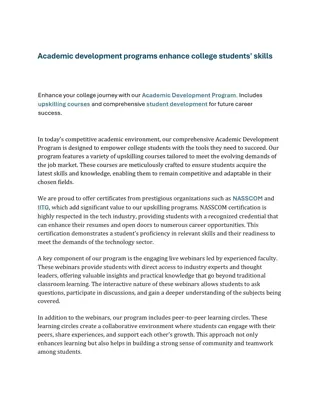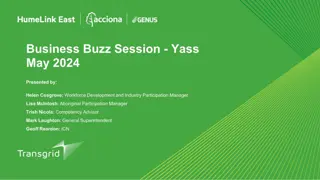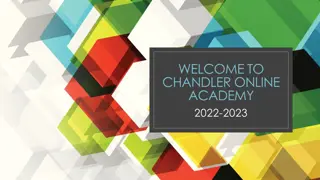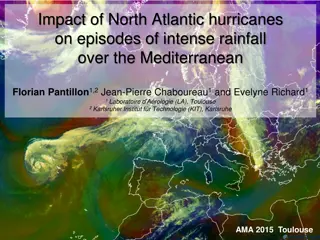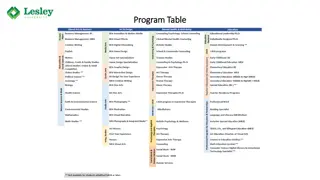Enhancing Academic Skills Development in Academic Discussion Channels
The academic skills development initiative in the Language for Politics and Society summer pre-sessional program at the University of Leeds focuses on preparing students for postgraduate studies in Politics, International Studies, Sociology, and Social Policy. Through the utilization of platforms like TEAMS, Zoom, and Flipgrid, a comprehensive approach including language and academic skills embedding is employed. The strategic planning of discussion channels for all four skills aims to create a supportive academic community and enhance student engagement. The implementation of clear instructions and active participation strategies is crucial in ensuring the success of the program.
Download Presentation

Please find below an Image/Link to download the presentation.
The content on the website is provided AS IS for your information and personal use only. It may not be sold, licensed, or shared on other websites without obtaining consent from the author.If you encounter any issues during the download, it is possible that the publisher has removed the file from their server.
You are allowed to download the files provided on this website for personal or commercial use, subject to the condition that they are used lawfully. All files are the property of their respective owners.
The content on the website is provided AS IS for your information and personal use only. It may not be sold, licensed, or shared on other websites without obtaining consent from the author.
E N D
Presentation Transcript
Creating and sustaining a buzz around academic skills development, in discussion channels Alison Leslie (module lead) and Denise de Pauw (co lead) Language for Politics and Society 6 week summer pre-sessional at University of Leeds Language Centre
Aims-to prepare students for PG study in schools of Politics and International Studies and Sociology and Social Policy Content led, with language and academic skills embedded 120 students- mostly from China Platforms- TEAMS, Zoom, Flipgrid Teachers- mix of new and experienced (EAP and institutional knowledge gap) About the course
Outline Why we planned discussion channels for 4 skills How we set these up; how we tried to encourage participation Some examples Our evaluations Student evaluation-some examples of comments Ideas for next year
Why we planned discussion channels for 4 skills We wanted to: create a space where skills development could be seen throughout the course: - TEAMS reorganises discussion threads in channels and gets very confusing; - content is king, and skills often get overlooked. provide a sharper focus on listening and speaking, as there were fewer opportunities for this online; help the students feel a sense of academic community, beyond the class groups. careful planning for online learning includes not just identifying the content to cover but also carefully tending to how you're going to support different types of interactions that are important to the learning process. This approach recognizes learning as both a social and a cognitive process, not merely a matter of information transmission. (Hodges et al, 2020)
How we set it up to encourage participation independent study materials instructed students to post and comment on one of the boards. We included clear instructions, but needed to keep reminding students of these and the implicit expectations (Tomic et al, 2020).
Example from writing discussion board Balance of teacher presence and hyper- responsiveness (Tomic et al, 2020).
Examples from speaking and listening.
Not well integrated to the main platform; Less than half of students posted their response to tasks; Students did not comment on each other's posts- only 3 comments on whole course; Many students watched videos up to 45 times; Bandwidth problems; However, lots of potential, e.g. downloading participation data for scrutiny; use of closed captions. Limitations of Flipgrid
Our evaluation: much more useful than anticipated Asynchronous format creates richer discussion and enables greater flexibility than the traditional seminar (Tomic et al, 2020): To an extent, but not consistent. Encouraging multiple formats helped students develop a distinct online voice and personality (George-Briant and Brooks, 2020): The students would need more time for this to bear fruit (6 week course) Students could engage more critically with the (theoretical) content: students have space to think (George-Briant and Brooks, 2020, Tomic, 2020). Makes learning more transparent; Gives us instant feedback (we could see how students and staff were engaging with materials); Worthwhile as a tool for developing asynchronous discussion skills in their own right.
Student evaluation Appreciation of opportunities for interaction but not a replacement for F2F: I think the best part is the setting of specialized boards for the students to share questions and suggestions. In my opinion, the best part of the module is its strong interactivity. After class, there will be many sections, such as reading, writing and speaking, for me to practice. There could be more face-to-face communication with more teachers rather than just post questions on discussion board? The effect of communicating through sending message is not so good. I think more activities should be hosted, student can organise their group for specific topic and communicate with other groups, the topic like daily life, subject, writing skills and so on. Through that way maybe we can meet more new friends and also can exchange our mind. Not just typing in discussion board.
Moving forward with online discussions 1. How can we engage more of the students more of the time? Develop their reflectiveness, and criticality- active construction of knowledge- extend content discussions in classroom channels. 2. How to keep them focused on the skills development from start to finish? "build in interdependence of tasks"(Wang and Chen, 2017). Make the academic skills much more explicit in the final project. Get students to both set expectations and review their participation in discussion channels as part of this (Wang and Chen, 2017).
References George-Briant, K. and Brooks, J. 2020. Online pedagogy: building learning communities. EAP in the North, May 2020. Hodges, C., Moore, S., Lockee, B., Trust, T. and Bond, A. 2020.The Difference Between Emergency Remote Teaching and Online Learning. [online] https://er.educause.edu/articles/2020/3/the-difference-between-emergency-remote- teaching-and-online-learning Tomic, S.; Roberts, E. and Lund, J. 2020. Designing learning and teaching online: the role of discussion forums. [online] https://www.advance-he.ac.uk/news-and-views/designing- learning-and-teaching-online-role-discussion-forums Wang, Y. and Chen, D. 2017. Assessing Online Discussions: A Holistic Approach. Journal of Educational Technology Systems 46(2) pp.178 190
